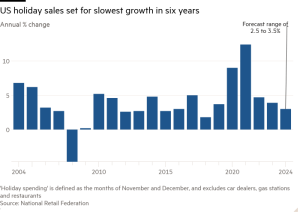Labour draws dividing line on tuition fees
This article is an on-site version of our Inside Politics newsletter. Subscribers can sign up here to get the newsletter delivered every weekday. If you’re not a subscriber, you can still receive the newsletter free for 30 days
Good morning. Now that we have Labour’s first Budget since the election, and the Conservative party’s first leader, the shape of British politics over the next few years is becoming clearer. (Parking, for a moment, any disruptive winds that might blow in from the US.)
One big battleground is going to be education. The clearest dividing line between Labour and the Conservatives at the moment is on tuition fees. Always keen to read your thoughts at the email address below.
Inside Politics is edited by Georgina Quach. Read the previous edition of the newsletter here. Please send gossip, thoughts and feedback to [email protected]
Collegiate clashes
We all knew that Bridget Phillipson’s reform plans would put her at odds with the Conservative party when it came to primary and secondary education. This is going to become clearer when the government reports on its review of both the curriculum taught in schools and the way it will be assessed.
One striking straw in the wind yesterday was that Phillipson did not answer when she was questioned about what role academies had played in the improvement of England’s schools (for more on that, Miranda Green ponders the input of outside innovators thoughtfully in her recent column).
But what I didn’t expect was that the inevitable rise in tuition fees would also prove divisive. I say “inevitable”, because the value of the fee has been eroded considerably by inflation and it hasn’t been increased since 2017, when Jo Johnson, then the higher education minister, and Justine Greening, then education secretary, drove through the change despite Theresa May’s doubts about the policy. If you don’t want universities to collapse you do need to, at the least, allow tuition fees to increase in line with inflation. Phillipson announced that they will go up in line with the retail price index to £9,535 in 2025, adding that there would be a rise in maintenance loans. Shadow education secretary Laura Trott said Labour was “declaring war on students”.
Given there is a sense among some Conservative MPs, I think correctly, that it is in their interest to look constructive on some occasions, and given that there is also a sense among some Tories that fees should go up with inflation, I expected that the two main parties would be as one on tuition fees. I think the new look Conservative leadership is probably going to end up regretting this one because it obviously looks disingenuous.
It also illustrates what Labour wants its dividing line at the moment to be: yes, we’ve made some hard choices, but what do the other lot want to do? To unpick our tax rises and have more spending cuts, to spend more, etc.
(Another reason why the Tories are making a mistake, politically speaking, is it leaves the field free for the Lib Dems to take up the role of constructive opposition, a label they really want to own this parliament.)
In policy terms, the change heightens the political difficulty with further fee increases, which will exceed £10,000 at some point this parliament. There’s an added pressure here though, which is that the repayment threshold for tuition fees is currently at £25,000. This means as of next year, any graduate working full time on the minimum wage will be on the hook for tuition fee repayments. Tuition fees have drifted very far indeed from their roots as an income contingent loan.
The fees system had three major advantages when it was introduced. First, it was an income stream for universities that operated essentially as a hypothecated tax. Second, is that it was a way of increasing tax that was politically easier for governments. Third, it was “progressive” — ie the more you got out of your degree the more you paid for it.
None of those advantages is really working at the moment. It has become politically difficult to raise fees, which means it is not much of an income stream for universities, nor is it a handy lever for the government. And it is now being levied essentially on any graduate in any form of full-time work.
Clearly, Labour’s review of university financing is going to have to recommend something pretty far-reaching and controversial — and something that will face a lot of opposition both inside and outside the government, too.
Now try this
This week, I mostly listened to Caroline Shaw’s soundtrack for Ken Burns’ new Leonardo da Vinci documentary while writing my column.
It’s finally here. US Election Countdown, the essential guide by our Washington reporter Steff Chávez, will soon be turning into White House Watch to assess the fallout of today’s presidential election. Sign up here to get the newsletter in your inbox every Tuesday and Thursday. Plus, we’ll have a special edition tomorrow.
Top stories today
Recommended newsletters for you
US Election Countdown — Money and politics in the race for the White House. Sign up here
One Must-Read — Remarkable journalism you won’t want to miss. Sign up here
#Labour #draws #dividing #line #tuition #fees






